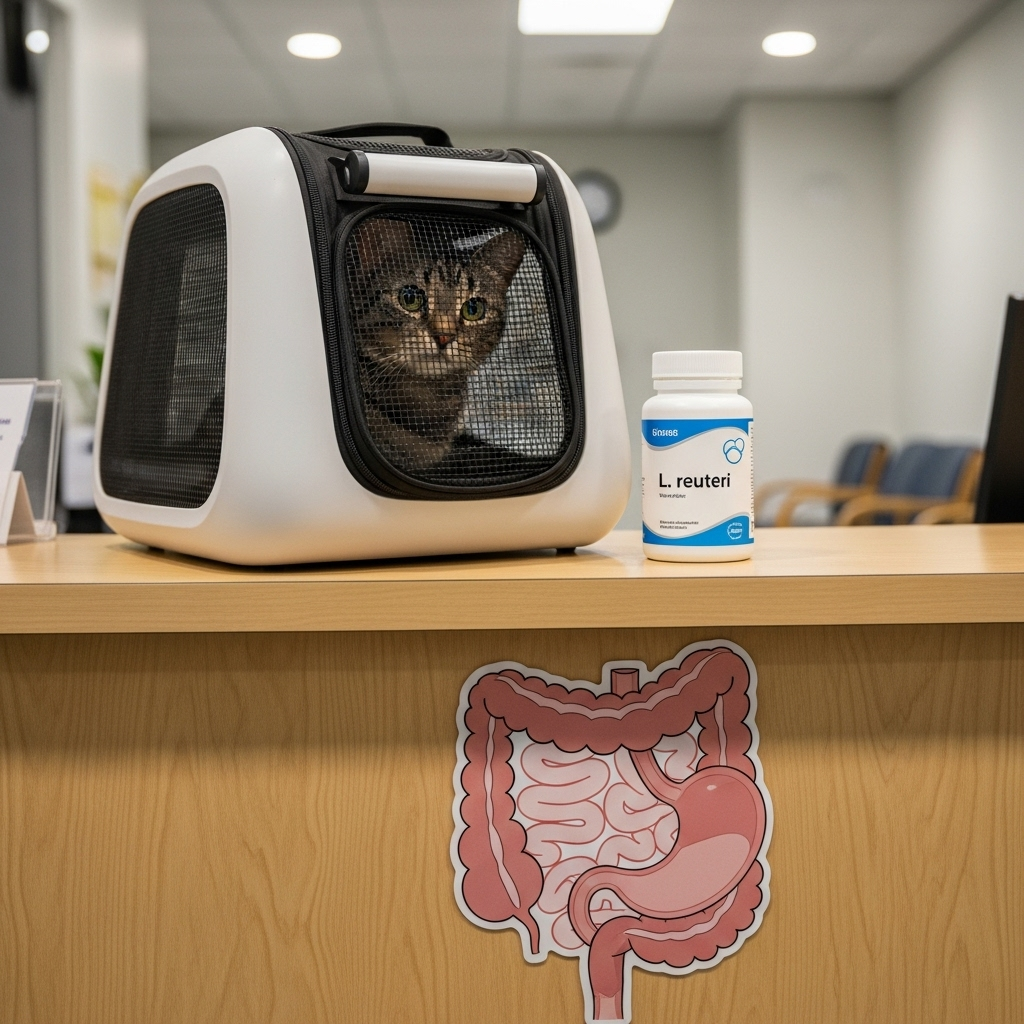Lactobacillus reuteri for Cats: Gentle Gut Support

Many cat owners are interested in probiotics to help their pets with occasional digestive upsets, improved stool quality, or general gut health. Lactobacillus reuteri for cats digestive support is one option you may see recommended or available in commercial pet products. This article explains what L. reuteri is, how it may help cats, safety considerations, how to choose and give a product, and when to contact your veterinarian.
What is Lactobacillus reuteri?
Lactobacillus reuteri (L. reuteri) is a species of beneficial bacteria commonly used as a probiotic in humans and animals. Probiotics are live microorganisms that, when given in adequate amounts, may help support a healthy balance of gut bacteria and normal digestive function. Different strains of L. reuteri can have different effects, so strain identity matters for expected benefits.
How L. reuteri may support a cat’s digestive system
Potential ways L. reuteri can support digestive health include:
- Helping maintain or restore a balanced intestinal microbiome after minor disruptions (diet change, travel, mild stress).
- Supporting normal stool consistency and regularity in some cats.
- Producing substances (like lactic acid) that can inhibit growth of some unwanted microbes in the gut.
- Potentially interacting with the intestinal immune system to promote tolerance and healthy barrier function.
Note: These effects are often modest and can be strain-specific. Not all cats will respond the same way.
Evidence and limitations
Research on probiotics in cats is growing, but is smaller compared with human research. Some studies and clinical observations suggest benefits for mild, short-term digestive upsets and for improving stool quality. However, results depend on the specific probiotic strain, dose, product quality, and the underlying cause of the problem. Probiotics are not a replacement for diagnosis and treatment of underlying disease (e.g., infections, pancreatitis, inflammatory bowel disease).
Forms, dosing, and administration
L. reuteri for cats digestive support is sold in several formats:
- Powders or sachets to sprinkle on food
- Chews or treats with added probiotic
- Capsules or tablets (which can sometimes be opened and mixed with food)
- Liquid drops or pastes
Products list colony forming units (CFU) on the label. Typical over-the-counter pet probiotics vary widely in CFU counts. Because research is strain-specific, follow the manufacturer’s dosing guidelines and ask your veterinarian for a product and dose recommendation tailored to your cat. For cats on antibiotics, give probiotics at least 1–2 hours apart from each antibiotic dose to reduce the chance the antibiotic will kill the probiotic bacteria.
Safety, side effects, and who should be cautious
Overall, L. reuteri and other probiotics are generally well tolerated in healthy cats. Possible mild side effects include temporary gas, mild bloating, or changes in stool during the first few days as the gut adjusts. More serious adverse events are uncommon but can occur in animals with severely weakened immune systems or significant underlying illness.
Discuss probiotics with your veterinarian before starting them if your cat has any of the following:
- Immunosuppression (e.g., receiving high‑dose steroids, chemotherapy)
- Severe, bloody, or chronic diarrhea
- Recent major surgery or a central venous catheter
- Other chronic health conditions that are not controlled
Choosing a quality product
When selecting a probiotic labeled for cats or containing L. reuteri, consider:
- Clear strain identification and CFU count (preferably guaranteed to expiration or “at end of shelf life”)
- Veterinary formulation or veterinary endorsement when available
- Manufacturing quality: GMP practices, third‑party testing, or lot testing for potency and purity
- Formulation suitable for cats (no toxic additives like xylitol or excessive fillers)
- Proper storage instructions (some require refrigeration, others are shelf-stable)
When to see the veterinarian
Use probiotics as a supportive measure for mild and short-lived digestive upset or as recommended by a veterinarian. Seek veterinary care promptly if your cat has:
- Persistent or worsening diarrhea
- Vomiting, lethargy, decreased appetite, or weight loss
- Blood in stool
- Other systemic signs or known chronic disease
Pros and Cons
| Pros | Cons |
|---|---|
| May improve stool consistency and mild digestive upset | Benefits are strain-specific and not guaranteed for every cat |
| Generally safe for healthy cats with minimal side effects | Not a substitute for veterinary diagnosis and treatment |
| Available in feline-friendly formats (powders, treats) | Quality varies; some products may have low viability or poor labeling |
Frequently Asked Questions
- Q: Can I give human L. reuteri products to my cat?
- A: It’s better to use products formulated for pets or to consult your veterinarian. Human probiotics may contain strains, doses, or additives that are not ideal for cats.
- Q: How long until I see results?
- A: Some pet owners notice changes in stool quality within a few days; others may need 2–4 weeks. If there is no improvement or your cat gets worse, stop the product and contact your vet.
- Q: Are probiotics safe to use during antibiotic treatment?
- A: Probiotics are commonly used alongside antibiotics to help reduce antibiotic-associated diarrhea. Space doses at least 1–2 hours apart. Discuss timing and product choice with your veterinarian.
- Q: Can kittens take L. reuteri?
- A: Many probiotics have formulations suitable for kittens, but age-appropriate dosing and veterinary guidance are important, especially for very young or vulnerable kittens.
Key Takeaways
- Lactobacillus reuteri is a probiotic species that may help support mild digestive issues and stool quality in some cats.
- Effects depend on the specific strain, dose, product quality, and the cat’s health status.
- Probiotics are generally safe for healthy cats but consult your veterinarian for kittens, ill or immunocompromised cats, and before combining with other treatments.
- Choose products with clear strain labeling, guaranteed potency, and veterinary guidance when possible.
- If digestive signs are severe, persistent, or accompanied by other symptoms, seek veterinary care promptly.
Disclaimer: This article is informational only and does not replace veterinary advice. Always consult your veterinarian before starting any new supplement for your cat, especially if your pet is pregnant, nursing, very young, elderly, ill, or on medications. If your cat has severe or persistent symptoms, seek immediate veterinary care.

Leave a Reply